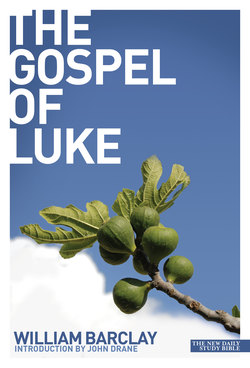Читать книгу Gospel of Luke - William Barclay - Страница 18
На сайте Литреса книга снята с продажи.
ОглавлениеA WONDROUS HYMN
Luke 1:46–56
And Mary said, ‘My soul magnifies the Lord, and my spirit has exulted in God, my Saviour, because he looked graciously on the humble estate of his servant. For – look you – from now on all generations shall call me blessed, for the Mighty One has done great things for me and his name is holy. His mercy is from generation to generation to those who fear him. He demonstrates his power with his arm. He scatters the proud in the plans of their hearts. He casts down the mighty from their seats of power. He exalts the humble. He fills those who are hungry with good things and he sends away empty those who are rich. He has helped Israel, his son, in that he has remembered his mercy – as he said to our fathers that he would – to Abraham and to his descendants forever.’
HERE we have a passage which has become one of the great hymns of the Church – the Magnificat. It is steeped in the Old Testament; and is closely related to Hannah’s song of praise in 1 Samuel 2:1–10. It has been said that religion is the opiate of the people; but it has also been said that the Magnificat is the most revolutionary document in the world.
It speaks of three of the revolutions of God.
(1) He scatters the proud in the plans of their hearts. That is a moral revolution. Christianity is the death of pride. Why? Because if people set their lives beside that of Christ, it tears away the last vestiges of their pride.
Sometimes something happens to us which with a vivid, revealing light shames us. The American writer O. Henry has a short story about a boy who was brought up in a village. In school he used to sit beside a girl and they were fond of each other. He went to the city and fell into evil ways. He became a pickpocket and a petty thief. One day he snatched an old lady’s purse. It was clever work and he was pleased. And then he saw coming down the street the girl whom he used to know, still sweet with the radiance of innocence. Suddenly he saw himself for the cheap, vile thing he was. Burning with shame, he leaned his head against the cool iron of a lamp standard. ‘God,’ he said, ‘I wish I could die.’ He saw himself.
Christ enables us to see ourselves. It is the death-blow to pride. The moral revolution has begun.
(2) He casts down the mighty – he exalts the humble. That is a social revolution. Christianity puts an end to the world’s labels and prestige.
Muretus was a wandering scholar of the middle ages. He was poor. In an Italian town he became ill and was taken to a hospital for waifs and strays. The doctors were discussing his case in Latin, never dreaming he could understand. They suggested that since he was such a worthless wanderer they might use him for medical experiments. He looked up and answered them in their own learned tongue, ‘Call no man worthless for whom Christ died.’
When we have realized what Christ did for each and every one of us, it is no longer possible to regard anyone as being beneath us. The social grades are gone.
(3) He has filled those who are hungry – those who are rich he has sent empty away. That is an economic revolution. A non-Christian society is an acquisitive society where people are out for as much as they can get. A Christian society is a society where no one dares to have too much while others have too little, where everyone must get only to give away.
There is loveliness in the Magnificat but in that loveliness there is dynamite. Christianity brings about a revolution in individuals and revolution in the world.
